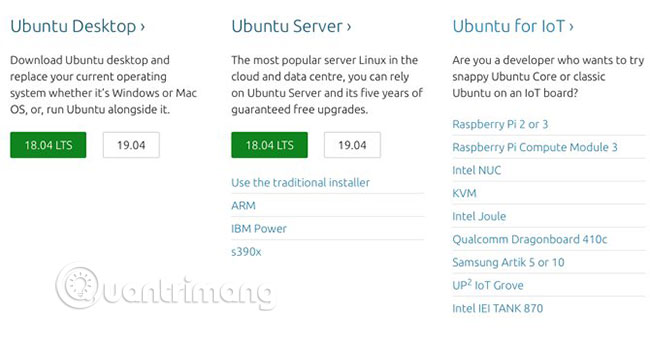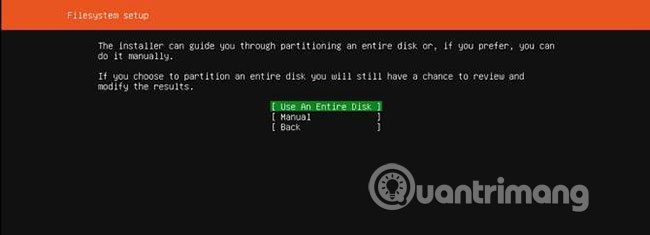Compare Debian and Ubuntu
There is a list of seemingly endless distributions to choose from if you are interested in Linux. One of the most popular distributions is Ubuntu. If you already know Linux, you may have heard of Ubuntu.
You may have heard that Ubuntu is based on another distribution, Debian. So which distribution should you choose? Which distribution is easier to fit with many different use cases?
Debian and Ubuntu - What is the best Linux distribution for laptops, desktops and servers?
- What is the main difference between Debian and Ubuntu?
- Used on laptops
- Use on desktop
- Use on server
- Compare Debian, Ubuntu and other distributions
What is the main difference between Debian and Ubuntu?
At first glance, Ubuntu and Debian seem similar. Both distributions use the same package management system and you often find software packaged for both. However, there are some key differences to note between Debian and Ubuntu.
Not all software available for Ubuntu is available for Debian due to license restrictions. Debian has a much stronger stance on free software. This also applies to firmware, so not all hardware that works with Ubuntu works with Debian.
Ubuntu also has a Personal Package Archive, commonly known as PPA. These allow you to easily install packages that are not available in the official Ubuntu repositories. This makes installing a wide range of software much easier than on Debian.
Restrictions imposed on Debian are not as strict as those used for some other distributions, but there are a few things to note. Debian also has a different release cycle than Ubuntu. Both this and the different license restrictions affect certain use cases, which will be further explained in the following section.
Used on laptops
As you probably already know in the previous section, Ubuntu is often easier to use than Debian on a laptop. Part of this belongs to firmware and third party software. Most hardware on new laptops lacks open source drivers, which means you'll have to switch to non-free binary (binary).
Some non-free binaries are available in the Debian archive, but the supported hardware scope in Ubuntu is larger. This in combination with the software available in PPA means you will have easier time to boot and run with proprietary software in Ubuntu.

One of the main advantages of Linux is that it is customizable. This means that if you spend a bit of effort, you can make Debian as well as Ubuntu run on a laptop.
Finally, if you want to run Ubuntu on a laptop, you just need to buy a laptop running this operating system. You may find someone selling Debian pre-installed laptops, but Ubuntu-installed laptops are more popular.
Use on desktop
When used on desktop computers, Debian is more comfortable than a laptop, especially if you choose the hardware carefully. If you build your own computer, this is easy. If you build your own computer, it will be easy. If you have an old computer, it's likely that your hardware is also supported.
With Ubuntu, the installation will be simpler. This is not necessarily a plus for all laptop users, but true for most users. Configuring is also quite easy in Ubuntu, and Debian will largely depend on the desktop you are using.

The most difficult time you face is when dealing with graphics cards. Nvidia provides drivers that provide good performance for many graphics cards. But if you want to use open source drivers, it's best to choose an AMD graphics card.
If you are looking for a Linux distribution to install in parallel with your Windows operating system, you can dual boot Debian or Ubuntu. There are many ways to run Ubuntu with Windows.
Use on server
Debian does not have a server download for a specific purpose. Instead, it provides a minimal base installer. The main option is to select the image for the CPU structure. After installing the base system, you will be able to install the software you need. From here you can choose server software or install in a more desktop-oriented way.
In the case of Ubuntu, many installers are available. Some installers are suitable for desktop use, while others are more convenient for using the server. There are still installers suitable for other use cases. Server image is a relatively minimal installation with no basic graphical interface and server software.

Debian is often used in server environments for several reasons. One major reason is because it is very stable (Debian comes with relatively old packages). They have been checked and verified, so there is less chance of errors.
Ubuntu is still a good choice for server software, but tends to use newer software versions. This is a plus if you need the features found in newer software versions, but that means the packages haven't been tested for a long enough time.

If you're curious, TipsMake.com has an article that distinguishes between desktop and server.
Compare Debian, Ubuntu and other distributions
What if you're wondering about choosing Debian or Ubuntu instead of distributing it like Arch or Fedora? One of the main advantages of using a distribution is their popularity. If you are looking for a solution to a problem, someone may have encountered a similar problem on Ubuntu or Debian. But this may not be true for other distributions.
This popularity is also useful when it comes to packages. You will find DEB packages running on Debian or Ubuntu for more software. You may not be able to find packages for other distributions. This is true for Ubuntu, because with the PPA system, you will find a lot of software available.
For most cases, determining which distribution is best depends on the individual preferences of each person. Ubuntu is often easier to use on the desktop while Debian is well suited for server use. That is, you can easily use Debian on a desktop or Ubuntu on the server, as long as your hardware is supported.
There are other reasons you may not want to use Ubuntu or Debian. If you're curious why you should choose another distribution, refer to the article comparing the most popular Linux distributions available for more details.
Wish you find the right choice!